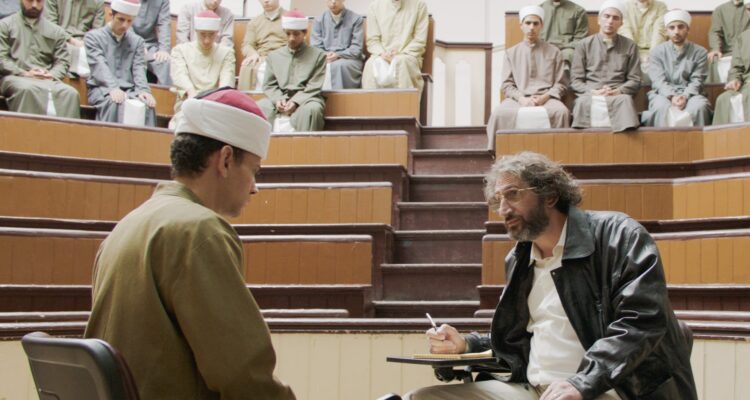In 2017, Swedish-Egyptian director Tarik Saleh’s breakthrough film “The Nile Hilton Incident” was the subject of much controversy and was ultimately banned in Egypt due to its in-depth portrayal of police corruption in modern-day Egypt. Five years later, Saleh is back with “Boy From Heaven” (“Walad Min Al Janna“), a transfixing feature tackling the harsh realities that occur in the country, this time exploring the complicated and corrupt relationship between religion and politics.
READ MORE: Cannes Film Festival 2022 Preview: 25 Must-See Films To Watch
The film centers on Adam (Tawfeek Barhom), the wide-eyed son of a small-town widowed fisherman, who receives the news that he has been awarded a state sponsorship to study at the prestigious Al-Azhar University in Cairo, one of the leading institutions of Sunni Islam. But, not too long after his arrival, Adam’s eagerness to learn more about his faith is crushed after a string of events lands him at the center of life-threatening turmoil.
First, the university’s Grand Imam, the highest-ranking religious leader, collapses suddenly and dies of a heart attack in front of the students, causing immediate uproar and debate over who should take his place. Adam befriends Zizo (Mehdi Dehbi), a fellow student who has been secretly working as an informant for Colonel Ibrahim (Saleh’s frequent collaborator Fares Fares) regarding the political views of the school’s imams but fears that his cover has been blown. Then when Adam witnesses Zizo’s murder, he is contacted by the disheveled-but-determined Ibrahim, who is eager to quickly fill Zizo’s spot and get a new set of eyes back inside the university. Naturally, it is decided that Adam is best for the job, and he is tasked with collecting information about people at the university and ensuring that the government’s preferred candidate ends up getting chosen as the new imam.
Just as it did with Zizo, Adam’s innocence and vulnerability — Ibrahim initially lures him with the promise of getting Adam’s ill father the proper medical assistance he needs — as a scholarship student with a squeaky clean record makes him an easy target and perfect candidate for Ibrahim. This allows Adam to get thrown into increasingly dangerous situations without much regard for whether he will make it out alive in the end. At one point, he is forced to infiltrate a group of radicalized Jihadist students and gain their trust by committing violent acts against the people they consider to be their enemies, including Adam’s bunkmate.
Not only is “Boy From Heaven” a gripping thriller about espionage, but it also functions as a coming-of-age story for Adam. He is a poor young man attempting to find his place in the world and explore his relationship with his faith, only to get caught in the mix of extreme circumstances. Adam, who is hesitant to become an informant but doesn’t have much choice in the matter due to the lack of power he wields, regularly meets with Ibrahim at a local cafe in secret to share his findings (or lack thereof) and receive new directions. He must learn and think quickly on his feet while making last-minute decisions. Barham pulls this complex role off effortlessly, impressively capturing his bewilderment as he experiences increasingly intricate situations that cause internal and external struggles.
Saleh tackles the complex and possibly controversial subject matter of “Boy From Heaven” in a head-on way, portraying the deep, corrupt ties within contemporary Egypt and the power struggles between religion and state with a grounded approach towards Egypt’s political atmosphere that feels drastically different from the many films made about Islamic countries. Some of the plot points are rooted in conventionalism and feel too familiar, but they are handled in riveting ways, and the performances from Barham and Fares — who make for an intriguing on-screen duo — carry the film towards a more successful and captivating territory. The only true fault lies with the script, which wavers at times and has a bit too much going on all at once for a movie with a two-hour runtime, although it does manage to make it pay off satisfyingly. Not to mention, it’s extremely well-crafted and beautifully shot, with Turkey and Sweden serving as convincing stand-ins for Egypt (Saleh is not allowed to enter the country) and managing to look as authentic as possible.
“Boy From Heaven” is a searing political thriller brimming with tension that examines religion in an honest and indiscriminately way that feels refreshing to witness in an age where Muslim people are more often than not portrayed through a prejudiced lens. Saleh’s film works on many different levels because it’s a layered blend of various elements from different genres. He has crafted a spy thriller that succeeds as a coming-of-age narrative and can also be an entertaining film that keeps you captivated up until the final breathtaking moments. [A]
Follow along with all our coverage from the 2022 Cannes Film Festival.

